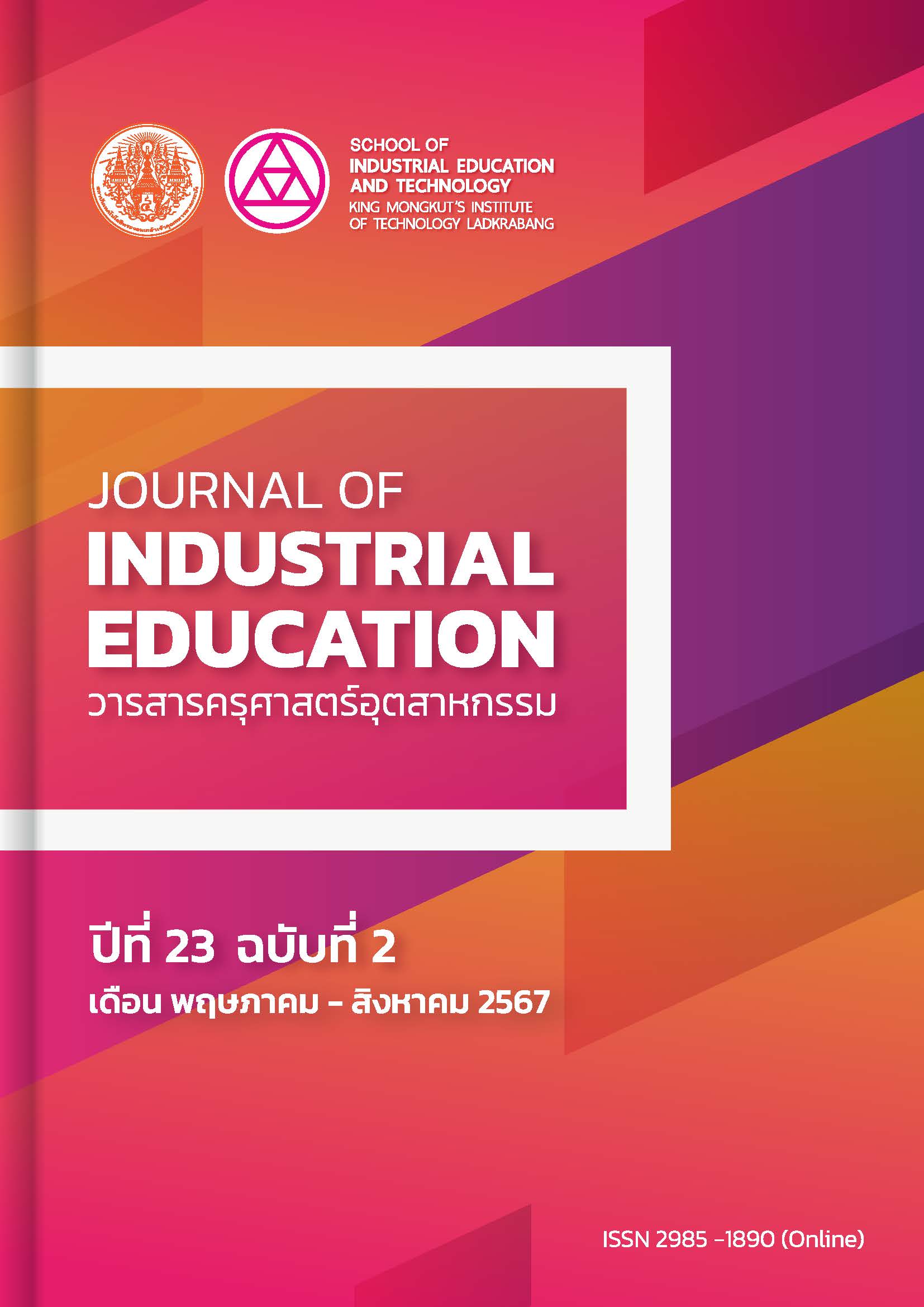THE DEVELOPMENT OF MATHEMATICS LEARNING ACHIEVEMENT OF MATHAYOMSUKSA FIVE STUDENTS ON SERIES BY USING COGNITIVELY GUIDED INSTRUCTION (CGI) AND QUESTIONING
DOI:
https://doi.org/10.55003/JIE.23204Keywords:
Cognitively Guided Instruction, CGI, Questioning, CGI and questioningAbstract
The development of mathematics learning achievement of mathayomsuksa five students on series by using cognitively guided instruction (CGI) and questioning, the sample in this research consisted of 34 mathayomsuksa five students of one classroom who were studying in the second semester of the academic year 2020 that was selected by cluster random sampling at Debsirin Nonthaburi School. The instruments used in this study were 1) nine mathematics lesson plans on series by using CGI and questioning, 2) questions to measure the achievement of mathematics on series, and 3) student’s opinions toward learning management questionnaire on series by using CGI and questioning. The data were analyzed in terms of mean, standard deviation, percentage, and t-test statistics. The results show that 1) the guidelines of learning activities by using CGI and questioning consisted of four steps: (1) present the problems, (2) analyze for solving problems, (3) present ideas and answers to problems, and (4) discuss ideas and answer of problems. 2) Most of students had mathematics learning achievements on series using CGI, and questioning after learning was higher than 60% at the .05 significance level. 3) Most students had the results in the questionnaire for student opinions toward learning management on series by using CGI and questioning at the high level.
References
Angganapattarakajorn, V. (2008). Development of instructional activities based on cognitive guided instruction through reasoning and connection skills that integrate mathematics content on data analysis and environmental science for Grade 6 students [Doctoral dissertation]. Srinakharinwirot University. (in Thai)
Angganapattarakajorn, V. (2009). Cognitively Guided Instruction (CGI): A paatern of mathemetics learning management. Journal of Education Burapha University, 21(1), 1-11. (in Thai)
Boonma, S., & Vibulrangsan, S. (2020). The development of cognitively guided instruction learning activities and socratic questioning techniques to enhance mathematical thinking on inequality for Mathayomsuksa 3 students. Srinakharinwirot Academic Journal of Education, 21(1), 77-91. (in Thai)
Carpenter, T. P., Fennema, E., Franke, M. L., Levi, L., & Empson, S. B. (2014). Children’s mathematics: Cognitively guided instruction (2nd ed.). Heinemann.
Chaitiang, A. (2010). Principle of instruction (5th ed.). Audient Store. (in Thai)
Chunim, C., & Supap, W. (2015). Development of mathematical thinking of Mathayomsuksa 1 students by using instruction activities based on Cognitive Guided Instruction (CGI) and questioning techniques of Badham. Journal of Community Development Research (Humanities and Social Sciences), 8(3), 104-155. (in Thai)
Fast, G. R. (2005). Assessing zimbabwean children's mathematics problem solving for cognitively guided instruction. FOCUS on Learning Problems in Mathematics, 27(4), 43-67.
Fennema, E. (1992). Cognitively guided instruction. NCRMSE Research Review: The Teaching and Learning of Mathematics, 1(2), 5-9.
Institute for the Promotion of Teaching Science and Technology. (2012). Professional mathematics teacher: The path to success. 3-Q Media. (in Thai)
Institute for the Promotion of Teaching Science and Technology. (2018). Course user manual Learning subject group Mathematics (revised edition 2017) high school level. Ministry of Education. (in Thai)
Kangsananon, K., Chuntra, C., & Lertamornpong, C. (2019). The development of mathematics learning achievement of Mathayomsuksa Five students on “probability” by using cognitively guided instruction and questioning. EAU Heritage Journal, 9(2), 80-92. (in Thai)
Keeranan, T. (2015). Statistic, research and evaluation in education (7th ed.). Sukhothai Thammathirat Open University. (in Thai)
Khemmanee, T. (2020). Teaching science: Knowledge for organizing an effective learning process (24th ed.). Chulalongkorn University Press. (in Thai)
Office of the Basic Education Commission. (2017). Indicators and core learning content mathematics learning group (revised edition 2017) according to the Basic Education Core Curriculum 2008. Minisity of Education. (in Thai)
Palawan, A. (2013). The effect of cognitively guided instruction activities in probability upon mathematics learning achievement, mathematical problem solving ability, metacognition awareness and self-discipline of Mathayomsuksa V students. Journal of Educational Research: Faculty of Education, Srinakharinwirot University, 8(1), 239-251. (in Thai)
Panich, V. (2012). A way to create learning for students in the 21st century. Tathata. (in Thai)
Pornkul, C. (2014). Teaching the thinking process: Theory and adoption (3rd ed.). Chulalongkorn University Press. (in Thai)
Schmalz, R. (1973). Categorization of questions that mathematics teachers ask. The Mathematics Teacher, 66(7), 619-626.
Siriwong, P., & Phetprot, P. (2014). Practice-based learning: Take lessons and learn by doing. Smart to Work. (in Thai) Susaorat, P. (2013). Development of thinking (5th ed.). 9119 Technical Printing. (in Thai)
Tepbunharn, V. (2017). Effects of using the representation and mathematical model combined with cognitively guided instruction approach on mathematical reasoning and connection abilities of lower secondary school students [Master’s Thesis]. Chula University. (in Thai)
Trilling, B., & Fadel, C. (2009). 21st Century skills: learning for life in our times. Jossey-Bass.
Williamson, A. (2013). Social media guidelines for parliaments. https://www.ipu.org/file/602/download.
Yamsang, N., & Intasang, S. (2012). Algebra: Learning content and teaching and learning in primary school. Mathematical Journal : Parima, 57(650-652), 20-38. (in Thai)
Downloads
Published
How to Cite
Issue
Section
License
Copyright (c) 2024 Journal of Industrial Education

This work is licensed under a Creative Commons Attribution-NonCommercial-NoDerivatives 4.0 International License.
"The opinions and contents including the words in papers are responsibility by the authors."
"ข้อคิดเห็น เนื้อหา รวมทั้งการใช้ภาษาในบทความถือเป็นความรับผิดชอบของผู้เขียน"



